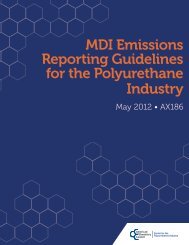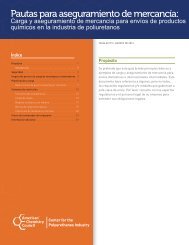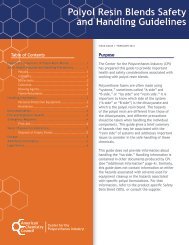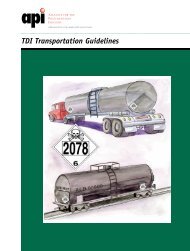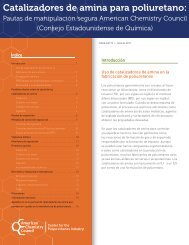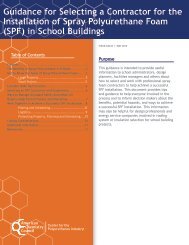MDI Transportation Guidelines - Polyurethanes - American ...
MDI Transportation Guidelines - Polyurethanes - American ...
MDI Transportation Guidelines - Polyurethanes - American ...
Create successful ePaper yourself
Turn your PDF publications into a flip-book with our unique Google optimized e-Paper software.
<strong>MDI</strong> transportation<br />
g u i d e l i n e s<br />
• Stacking;<br />
• Leakproofness (liquids only);<br />
• Hydrostatic (liquids only), and<br />
• Drop tests.<br />
Each container must be visually inspected, tested for leakproofness, and marked with the retest date<br />
(if used for transporting liquids) every 2.5 years from the date of manufacture (49 CFR §180.352).<br />
4.3.3 Record keeping<br />
The person certifying the testing of an IBC in Hazardous Materials service must keep records of periodic<br />
retests and initial and periodic inspections. Records must include:<br />
• Design types and packaging specifications;<br />
• Test and inspection dates;<br />
• Name and address of test and inspection facilities;<br />
• Names of persons conducting tests or inspections; and<br />
• Test or inspection specifics and results.<br />
Records must be signed by the person conducting the test and must be kept for each packaging at<br />
each location where periodic tests are conducted. These records must be kept until such tests are<br />
successfully performed again or for 2.5 years from the date of the last test.<br />
4.4 Drums<br />
<strong>MDI</strong> is not classified as a hazardous material by the DOT if shipped in a single container in quantities less<br />
than 5,000 pounds. Thus, <strong>MDI</strong> is not regulated in drums. However, in accordance with their commitments to<br />
Responsible Care ® , <strong>MDI</strong> producers typically ship <strong>MDI</strong> in packaging that satisfies stringent DOT performance<br />
tests designed to ensure that packaging integrity will be maintained.<br />
[Although drum shipments of <strong>MDI</strong> are not regulated by the DOT, producers generally voluntarily comply with the relevant<br />
modal transport regulations for road (49 CFR), rail (49 CFR), air (49 CFR or ICAO/IATA), sea (IMDG) or inland<br />
waterway (33 CFR). The producers recommend that drums be constructed in conformance with the standards<br />
applicable for the particular material of construction (i.e., steel, plastic, and fiberboard). See 49 CFR § 178.505-509.]<br />
[Additionally, the producers recommend that drums must meet the performance tests prescribed in the regulations.<br />
See 49 CFR §§ 178.600-178.608. See Appendix 5. These regulations also include a provision that the<br />
drums bear certification marks indicating compliance with the UN performance oriented packaging standards<br />
to the appropriate product density and hazard level. 49 CFR § 178.503.]<br />
4.4.1 Drum Specifications<br />
Materials of construction of the drum and all fittings and gaskets must be compatible with the product.<br />
49 CFR § 173.24(e). Drums must be inspected for integrity, tightness, dryness, cleanliness and<br />
absence of rust or foreign particles before filling. See 49 CFR § 173.22(a)(2). Additionally, all diisocyanate<br />
producers agree that open head type drums should not be used for P<strong>MDI</strong> products due to the<br />
potential for leakage and/or contamination.<br />
Copyright 2001, <strong>American</strong> Plastics Council<br />
13



